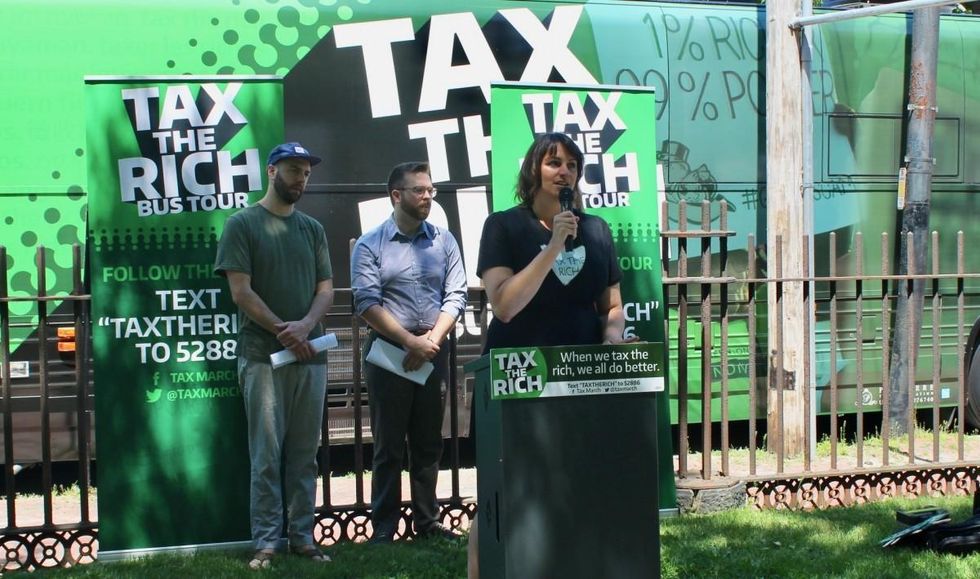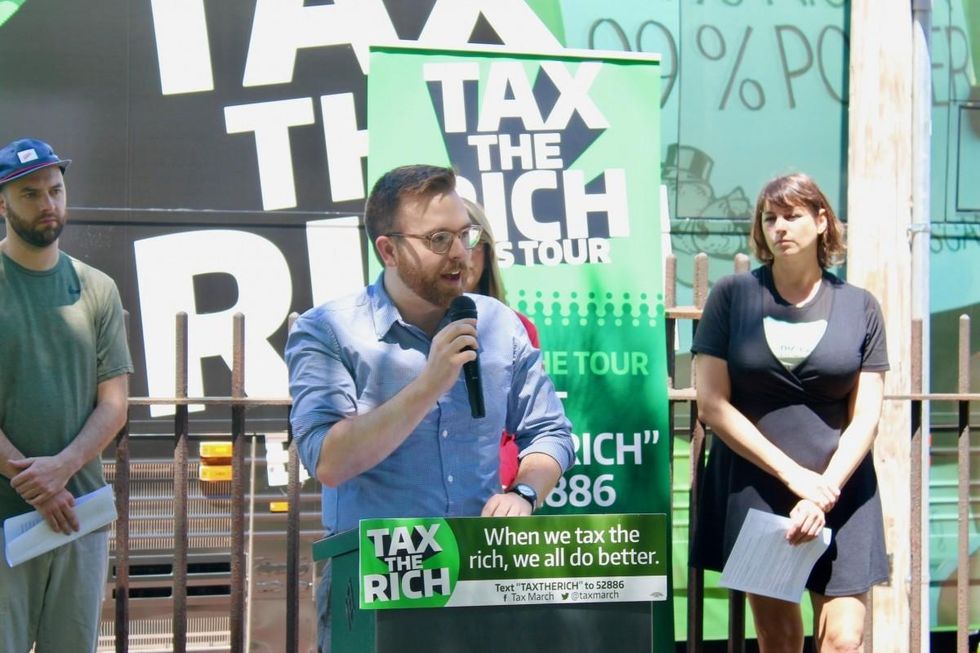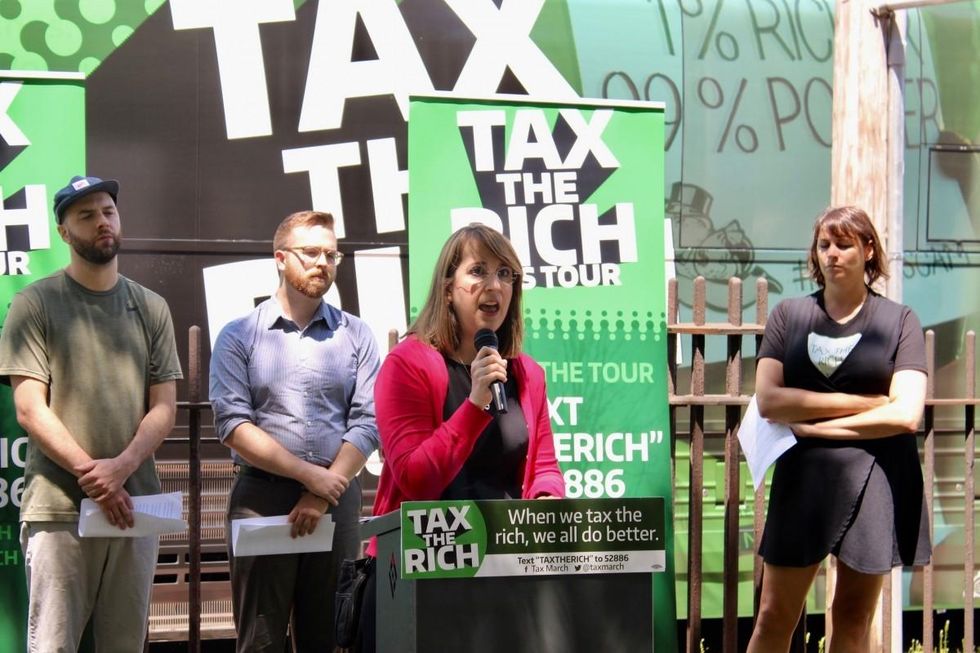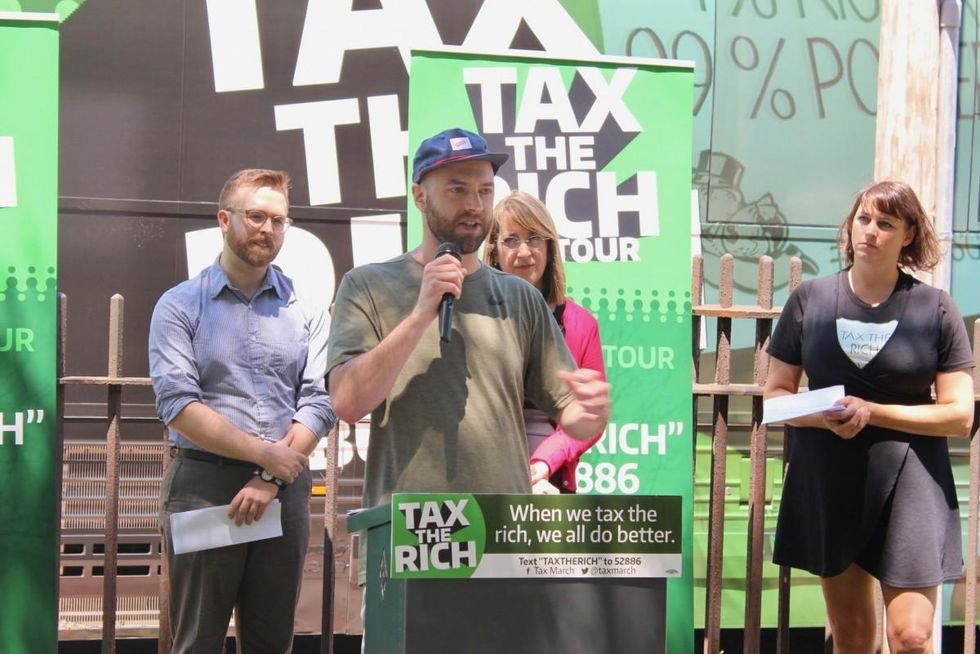
Attendees of the Tax March event on Tuesday in Portland, Maine. (Photo: Eoin Higgins/Common Dreams/cc)
The 'System Doesn't Work': National Group Finds Local Support for 'Tax the Rich' Message During US Bus Tour
Mainers across the political spectrum approve of raising taxes on the rich
Democrat, Republican, Independent: Mainers want to tax the rich.
That's one of the takeaways from recent polling numbers released by the advocacy group Tax March, which stopped in Portland on Tuesday to deliver the results of the polling and promote the group's message of higher taxes on the rich and more equitable funding for social programs.
Support for taxing the rich cuts across ideological lines, "including 90 percent of Democrats, 77 percent of independents, and even 55 percent of Republicans," the group said in a statement (pdf). "Just 23 percent of Maine voters are opposed to raising taxes on the rich."

Standing in front of the group's tour bus, which is traveling across the country to raise awareness for taxing wealthy Americans, Tax March executive director, Maura Quint, told the crowd at Portland's Lincoln Park in her opening remarks Tuesday that the economy was not just the rich, but working people.
"The economy is us," said Quint.
Quint cited the group's polling in Maine as evidence that the system is not working well.
"Seventy-four percent of Maine voters support raising taxes on the rich," she said.
The polling also found that 63 percent of Mainers believe the rich do not pay their fair share in taxes and that 58 percent of Maine voters believe the 2017 tax cuts signed by President Donald Trump should be repealed.

In his comments to the crowd, Ryan Fectau, the Maine state House assistant majority leader, said that the blue collar, hardworking people of Maine just want a "fair, unrigged economy."
"The tax system doesn't work," said Fectau.

Hillary Koch, a caregiver in the Portland area, said that due to her son's diabetes, the high cost of insulin is always a danger for her family's finances. The expense is due to predatory price gouging by companies like Eli Lilly, and the outrage is compounded by the fact that Lilly and other large corporations pay nothing in taxes.
"We need economic reform that benefits all of us," said Koch.

The final speaker, Dave Aceto, said that the tax cuts were harmful for small business owners like himself.
"It's increasingly looking like instead of helping small business owners, it's helping huge corporations and Sue's out of state donors," said Aceto, referring to Sen. Susan Collins (R-Maine), who voted for Trump's tax bill.
In its statement announcing the polling results, Tax March said that the survey made one thing clear--Maine is part of a national trend.
"These state-level results align with previous, nationally representative polling showing strong public support for taxing the rich, concerns about wealthier Americans failing to pay their fair share, and the implications of what an imbalanced tax system could mean for popular government programs," Tax March said.
An Urgent Message From Our Co-Founder
Dear Common Dreams reader, The U.S. is on a fast track to authoritarianism like nothing I've ever seen. Meanwhile, corporate news outlets are utterly capitulating to Trump, twisting their coverage to avoid drawing his ire while lining up to stuff cash in his pockets. That's why I believe that Common Dreams is doing the best and most consequential reporting that we've ever done. Our small but mighty team is a progressive reporting powerhouse, covering the news every day that the corporate media never will. Our mission has always been simple: To inform. To inspire. And to ignite change for the common good. Now here's the key piece that I want all our readers to understand: None of this would be possible without your financial support. That's not just some fundraising cliche. It's the absolute and literal truth. We don't accept corporate advertising and never will. We don't have a paywall because we don't think people should be blocked from critical news based on their ability to pay. Everything we do is funded by the donations of readers like you. Will you donate now to help power the nonprofit, independent reporting of Common Dreams? Thank you for being a vital member of our community. Together, we can keep independent journalism alive when it’s needed most. - Craig Brown, Co-founder |
Democrat, Republican, Independent: Mainers want to tax the rich.
That's one of the takeaways from recent polling numbers released by the advocacy group Tax March, which stopped in Portland on Tuesday to deliver the results of the polling and promote the group's message of higher taxes on the rich and more equitable funding for social programs.
Support for taxing the rich cuts across ideological lines, "including 90 percent of Democrats, 77 percent of independents, and even 55 percent of Republicans," the group said in a statement (pdf). "Just 23 percent of Maine voters are opposed to raising taxes on the rich."

Standing in front of the group's tour bus, which is traveling across the country to raise awareness for taxing wealthy Americans, Tax March executive director, Maura Quint, told the crowd at Portland's Lincoln Park in her opening remarks Tuesday that the economy was not just the rich, but working people.
"The economy is us," said Quint.
Quint cited the group's polling in Maine as evidence that the system is not working well.
"Seventy-four percent of Maine voters support raising taxes on the rich," she said.
The polling also found that 63 percent of Mainers believe the rich do not pay their fair share in taxes and that 58 percent of Maine voters believe the 2017 tax cuts signed by President Donald Trump should be repealed.

In his comments to the crowd, Ryan Fectau, the Maine state House assistant majority leader, said that the blue collar, hardworking people of Maine just want a "fair, unrigged economy."
"The tax system doesn't work," said Fectau.

Hillary Koch, a caregiver in the Portland area, said that due to her son's diabetes, the high cost of insulin is always a danger for her family's finances. The expense is due to predatory price gouging by companies like Eli Lilly, and the outrage is compounded by the fact that Lilly and other large corporations pay nothing in taxes.
"We need economic reform that benefits all of us," said Koch.

The final speaker, Dave Aceto, said that the tax cuts were harmful for small business owners like himself.
"It's increasingly looking like instead of helping small business owners, it's helping huge corporations and Sue's out of state donors," said Aceto, referring to Sen. Susan Collins (R-Maine), who voted for Trump's tax bill.
In its statement announcing the polling results, Tax March said that the survey made one thing clear--Maine is part of a national trend.
"These state-level results align with previous, nationally representative polling showing strong public support for taxing the rich, concerns about wealthier Americans failing to pay their fair share, and the implications of what an imbalanced tax system could mean for popular government programs," Tax March said.
Democrat, Republican, Independent: Mainers want to tax the rich.
That's one of the takeaways from recent polling numbers released by the advocacy group Tax March, which stopped in Portland on Tuesday to deliver the results of the polling and promote the group's message of higher taxes on the rich and more equitable funding for social programs.
Support for taxing the rich cuts across ideological lines, "including 90 percent of Democrats, 77 percent of independents, and even 55 percent of Republicans," the group said in a statement (pdf). "Just 23 percent of Maine voters are opposed to raising taxes on the rich."

Standing in front of the group's tour bus, which is traveling across the country to raise awareness for taxing wealthy Americans, Tax March executive director, Maura Quint, told the crowd at Portland's Lincoln Park in her opening remarks Tuesday that the economy was not just the rich, but working people.
"The economy is us," said Quint.
Quint cited the group's polling in Maine as evidence that the system is not working well.
"Seventy-four percent of Maine voters support raising taxes on the rich," she said.
The polling also found that 63 percent of Mainers believe the rich do not pay their fair share in taxes and that 58 percent of Maine voters believe the 2017 tax cuts signed by President Donald Trump should be repealed.

In his comments to the crowd, Ryan Fectau, the Maine state House assistant majority leader, said that the blue collar, hardworking people of Maine just want a "fair, unrigged economy."
"The tax system doesn't work," said Fectau.

Hillary Koch, a caregiver in the Portland area, said that due to her son's diabetes, the high cost of insulin is always a danger for her family's finances. The expense is due to predatory price gouging by companies like Eli Lilly, and the outrage is compounded by the fact that Lilly and other large corporations pay nothing in taxes.
"We need economic reform that benefits all of us," said Koch.

The final speaker, Dave Aceto, said that the tax cuts were harmful for small business owners like himself.
"It's increasingly looking like instead of helping small business owners, it's helping huge corporations and Sue's out of state donors," said Aceto, referring to Sen. Susan Collins (R-Maine), who voted for Trump's tax bill.
In its statement announcing the polling results, Tax March said that the survey made one thing clear--Maine is part of a national trend.
"These state-level results align with previous, nationally representative polling showing strong public support for taxing the rich, concerns about wealthier Americans failing to pay their fair share, and the implications of what an imbalanced tax system could mean for popular government programs," Tax March said.

